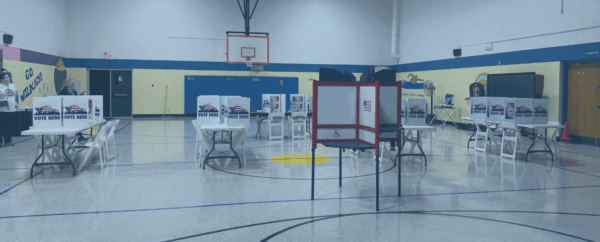Conversation starters to improve your poll worker training

Image: For this research project, participants documented their experience serving as poll workers in the 2024 General Election.
On election day, poll workers make sure voters can cast their ballots, answer unexpected questions, problem solve on the spot and are essentially the face of elections.
Their training is where they learn how to best support voters.
We wanted to know more about the experience.
So in 2024, we took on a research project to learn more about poll workers across the country. Specifically, we wanted to understand the relationship poll workers have with each other and with voters. Our small but mighty team of civic designers across the United States set out with a research notebook and jumped into the 17-hour day during the General Election.
You can read our findings in the full report, The Face of Elections.
What we learned helped us create a set of conversation starters — practical questions that election offices can use to reflect on and improve their poll worker training.
Think of these questions as a starting point rather than a checklist. Use them to guide the conversations you want to have in your office about what’s working about your poll worker training and where you might want to improve.
Fostering community and making connections
Cultivating community is a big part of what poll workers do, whether it’s on their official job description or not. Here are a few questions you can ask to support poll workers in serving their community.
- How can we further encourage and leverage the sense of community poll workers bring?
- How can we promote and highlight the role of poll workers in making community connections?
- Are there any personal touches or elements of local culture we can encourage and invite poll workers to share?
Navigating policy to make decisions
We saw how poll workers often need to troubleshoot and make decisions on election day to support the voters they serve. The job requires navigating policy, thinking on your feet and problem solving. Here are some questions to ask to support them.
- What specific training do experienced poll workers need compared to new poll workers?
- How can the knowledge of experienced poll workers be leveraged? What steps can we take to capture and disseminate this knowledge to ensure it’s readily available on election day?
- How can we encourage and develop emergent leadership behavior among poll workers? Are there mentorship opportunities that can help foster this?
- What mindsets contribute to successful emergent leadership behaviors in poll workers?
- How can training emphasize proactiveness in troubleshooting and problem-solving skills? How can training strengthen the capacity for poll workers to be collaborative with each other?
You can use them in a training workshop or a debrief session. If they are part of a debriefing session, see our guide for more guidance.
For the full insights from this research, read the full report here.
About this work
These questions come from research led by Andrea Miranda Salas.

